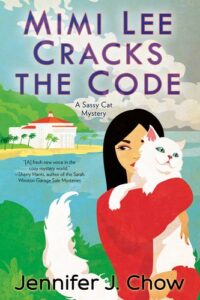Cozy mysteries often feature small towns because they’re, well, so cozy. An intimate setting offers something comforting with its predetermined town layout and its recurring cast of characters. It’s like visiting a safe, known community every time you flip through the pages of a cozy mystery.
Even in a series like my own Sassy Cat Mysteries, which is set in urban Los Angeles, there is a sense of community. I achieve this in my books by highlighting fun neighborhood enclaves and featuring quirky but loveable side characters. Also, I try to keep the suspects list narrow, so that the mystery can be feasibly solved by the star sleuth.
With a small cozy setting in a mystery, there is a chance of getting the Jessica Fletcher effect. Like in the Murder, She Wrote series, the location can become too much like Cabot Cove, with dead bodies appearing at an alarming rate in a tiny town. How realistic is that?
To counteract that effect, I’ve seen authors briefly relocate their sleuths. This changes up the usual cozy setting and allows for more authentic main characters. After all, real people take breaks and go on trips. My own Mimi Lee Cracks the Code has my protagonist visiting nearby Catalina Island with her boyfriend Josh. They’re expecting a romantic getaway, but their trip goes awry when they find themselves dealing with a crime.
I’m not the only cozy mystery writer whose characters have traveled in their books. Here are a few other recent examples (in release date order):

V.M. Burns’ A Tourist’s Guide to Murder (Kensington Cozies, January 2021)
Bookstore owner Samantha Washington and her friends go on a weeklong trip to England. Soon, they find themselves sleuthing along the same London streets which inspired great mystery authors like Agatha Christie and Arthur Conan Doyle.

Lucy Burdette’s A Scone of Contention (Crooked Lane Books, August 2021)
Key West food critic Hayley Snow travels to Scotland on her long-delayed honeymoon, but the sweet trip gets spoiled when both a poisoning and a fatal tumble occur.

Kate Lansing’s Mulled to Death (Berkley, October 2021)
Winery owner Parker Valentine goes on a weekend getaway with her boyfriend. It’s a fun ski trip until the resort owner dies.
It makes sense that cozy mysteries sometimes employ a change of scenery. Travel freshens up a routine series. Maybe it’s even a relief for those long-suffering residents who live in the amateur sleuth’s hometown.
Beyond serving as a break, though, a new location provides benefits to both the cozy reader and the mystery writer.
Upping the Stakes for the Reader
Travel pushes a main character out of their comfort (and comfy) zone. In fact, a lot of cozy mystery series start with the protagonist leaving one location and settling down in a place with a totally different kind of atmosphere.
- Olivia Matthews’ Murder by Page One relocates a librarian from Brooklyn to a quirky small town in Georgia.
Tension will organically ratchet up in the story because the detective needs to navigate a new location. It’s tough to spot clues in an unknown and unfamiliar territory. Plus, who knows whether the police in charge of the investigation will treat the sleuth well or not?
When the main character travels in the middle of a book series, it can mean that their buddies aren’t around. They won’t be able to rely on their sidekicks like usual. However, some do travel with friends or partners, so there may be a few familiar pals tagging along. (I’m lucky that my pet groomer sleuth has a talking sassy cat as a partner; Marshmallow is portable.)
Cozy mysteries sometimes use the town’s residents as sources of information, but the typical gossip grapevine withers away in a different locale. The sleuth then has to rely on personal observations and innate intelligence to crack the case.
- Vivien Chien’s Fatal Fried Rice has the main character going from her usual Asia Village community to attend a culinary school—where she soon stumbles upon a dead body.
For cozy mysteries with a vacation theme, there is built-in suspense since the protagonist can only stay in the new place for a short while. Will they be able to solve the crime before it’s too late? A ticking clock results in incredible pressure.
- In Olivia Blacke’s No Memes of Escape, the stressful “destination” is a locked escape room, where one of the players soon winds up dead.
Increased Creativity for the Author
As an author, books with traveling can offer writing perks. A different location than the usual setting may reveal enlightening facts. As a bonus, the research might involve actual physical travel. Digging up information to recreate a specific geographic atmosphere includes fun stuff like studying maps, trying out new food, and taking plenty of photos. These intricate details will ground the story in a location and make it more appealing to write (and, hopefully, to read).
A new city or a different country for murder often elicits creativity. For example, a writer might think of a crime that is tied to a particular place in a unique way.
- In Naomi Hirahara’s An Eternal Lei, an unusual lei causes the victim to go into a medically-induced coma.
When a writer uses a fresh setting as a backdrop, the descriptions will often flow. Since the location is new to the protagonist (and perhaps the author), it can be explored with greater depth and insight.
- Tina Kashian’s Mistletoe, Moussaka, and Murder has a murder occurring offshore in the icy waters of the Atlantic Ocean during a Polar Bear Plunge event.
Furthermore, the setting doesn’t just include the physical place but also the interesting individuals the protagonist is bound to meet. These new characters can only serve to enhance the plot.
Taking main characters out of the comfortable places where they live is beneficial on multiple levels. It adds to the three-dimensionality of the sleuth and provides an intriguing setting for natural tension to arise. A change of scenery may also inspire the author to overflow with creativity when doing research and writing the story. Therefore, I’m all for main characters traveling in cozy mysteries and escaping the Cabot Cove effect, and I think amateur sleuths placed in new settings will result in better books for both readers and writers.
***


















